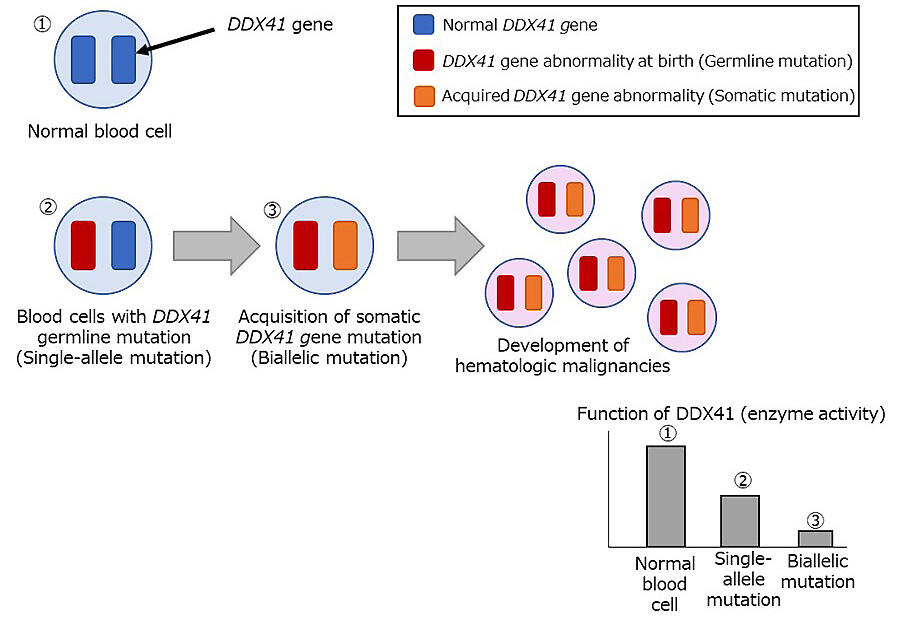A research group led by Professor Hirotaka Matsui of the Faculty of Life Sciences, Kumamoto University, has focused on the DDX41 gene, known as one of the genes responsible for hematological malignancies such as acute myeloid leukemia (AML) and myelodysplastic syndromes (MDS), and analyzed in detail the damage caused to cells by abnormalities in the gene. They found that the associated decrease in intracellular DDX41 protein disrupts the coordination of RNA splicing and transcription elongation, two important biological phenomena that are normally coordinated, and causes impaired blood cell production via impaired DNA replication. While conducting gene expression analysis using the DNA/RNA of hematopoietic tumor cells around 2015, the research group noticed that cases with the DDX41 mutation trended toward fewer tumor cells in peripheral blood and bone marrow. Although DDX41 was thought to be an RNA splicing factor, its role remained unclear, and research was initiated to understand why it exhibits these unique disease phenotypes. By analyzing the RNA sequences to which DDX41 binds, they found that DDX41 is involved in RNA splicing and plays a role in coordinating RNA splicing and transcription elongation.

In normal blood cells, there are two DDX41 genes, one of paternal origin and one of maternal origin, and neither of them has an abnormal gene sequence (①). However, some individuals are born with an abnormal sequence in one of their DDX41 genes (②), resulting in insufficient enzymatic activity of the DDX41 protein. If the blood cells of these individuals later acquire an acquired mutation in the originally normal DDX41 gene (③), the function of DDX41 is further impaired, leading to the development of hematologic malignancies.
Provided by Kumamoto University
When the group prepared cells with reduced amounts of DDX41 (knockdown cells) and analyzed them for changes, they found that DNA replication in the S-phase of the cell cycle was slightly impaired in DDX41 knockdown cells, and that the existence of DNA damage associated with the DNA replication impairment is ignored and not adequately repaired by the time the cells underwent cell division because the damage was slight. This left DNA damage in cells that had undergone cell division, resulting in strong morphological abnormalities and cell death.
The group also explored the causes of DNA replication defects caused by decreased expression of DDX41. RNA splicing is known to proceed in conjunction and in coordination with transcription elongation, and they found DDX41 interacts with both RNA splicing factors and transcription elongation factors. This increased the risk of conflict between transcription elongation factors and DNA replication, which could be linked to DNA replication defects. Since these phenomena were observed not only in cultured cells but also in blood cells from mice artificially transfected with the DDX41 mutation, the research group assumed that the DDX41 mutation caused hematopoietic defects through this mechanism.
"Although we have identified to some extent the mechanism by which reduced expression of DDX41 mutation causes impaired blood cell production, we believe that further research is needed to understand why DDX41 mutation alone can cause tumor development," explained Matsui.
Journal Information
Publication: Leukemia
Title: DDX41 coordinates RNA splicing and transcriptional elongation to prevent DNA replication stress in hematopoietic cells
DOI: 10.1038/s41375-022-01708-9
This article has been translated by JST with permission from The Science News Ltd.(https://sci-news.co.jp/). Unauthorized reproduction of the article and photographs is prohibited.




